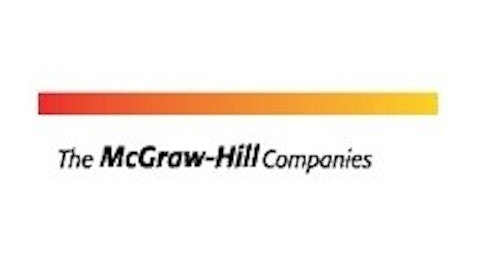Recently, shares of The McGraw-Hill Companies, Inc. (NYSE:MHP) fell by 11% on Tuesday after the US Department of Justice (DOJ) announced that it is filing a lawsuit against its Standard & Poor’s rating service unit. McGraw Hill has lost $3.7 billion in market capitalization in last two days and the US government is seeking $5 billion in compensation.
What Went Wrong?
The US government believes that S&P mislead investors in between 2004 and 2007 and gave a high rating to securities to promote the interest of the firm and that of the investment banks. The company ignored the high credit risk associated with the securities and influenced investors to buy these securities on the basis of their good ratings. This ultimately led to the financial breakdown in the United States. The DOJ said – “The Justice Department alleges that S&P knew the housing market was collapsing but was intentionally slow to downgrade hundreds of securities because of concerns that such a move would cut off the pipeline of deals and anger issuer clients.”

Financials & Future Strategy
McGraw Hill’s results for the third quarter of 2012 were above analysts’ expectations. The company posted adjusted quarterly earnings of $1.33 per share – a year-over-year growth of 10%. The major growth came from the company’s financial business. However, the company’s education business saw a decrease of 11% in revenue and 15% in adjusted operating profit during the third quarter. The company has a current dividend yield of 1.9% and long term earning growth projections of 14.8%.
McGraw Hill is focusing on changing its business model and is seeking to expand into business sectors capable of delivering high growth. It has recently sold off its education division for $2.5 billion. The company is planning to change its name to McGraw Hill Financial and will mainly concentrate on capital and commodity markets.
Competition Scenario
S&P largest competitor is the Moody’s Corporation (NYSE:MCO). The company reported third quarter revenue of $688.5 million – year-over-year growth of 30%. Expenses also saw an increase of 25% as compared to last year. It achieved double digit revenue growth in all its business segments during the third quarter. These results suggest that the company is performing very well and future growth prospects are very high.
Dun & Bradstreet Corp (NYSE:DNB) is the world’s leading provider of commercial information and business insights. Third quarter results were very good; the company reported a year-on-year growth of 24% in diluted EPS and 48% from GAAP diluted EPS. The company expects an annual growth of 3% in revenue and operating income growth of 4% to 7%. The company continues to perform as per the analyst expectations and future prospects are very bright. This is a must buy stock.
Fitch Ratings is jointly owned subsidiary of FIMALAC and Hearst Corporation. It is considered amongst the big three credit rating agencies, along with S&P and Moody’s. It has been criticized in the recent past for collateral debt obligation (CDO) losses. However, it stood apart from other rating agencies by warning the market in pre-crisis reports.
Continue Investing?
I believe that the US Department of Justice is overreacting. S&P reviewed the same sub-prime mortgage data that was available to the rest of the market. Moreover, the CDOs that the Department of Justice is talking about received almost the same ratings as from the other rating agencies. The company even downgraded the rating of many securities backed by residential mortgages in 2007. It even warned of the deteriorating conditions in the housing market.
Thus S&P was not purposefully involved in keeping the ratings high. The overall financial risk management system of the industry was not able to predict the coming downfall on time. This caused a delay for the S&P to take action, but it did downgrade the ratings before the other industry competitors.
I believe that the company is not at fault and there is nothing to worry about. This news has caused a sudden downfall in the stock prise, but investors will regain their confidence once they realize that the charges put up by the US Department of Justice are baseless.
Conclusion
Thus it can be said that civil lawsuits have affected the stock position of McGraw Hill, but this is only a temporary phenomenon. There is no reason for the lawsuit filed by Department of Justice to succeed as all the facts are supporting S&P.
The company has a report of strong financial performance backed by high dividend yield. The company has experienced continued growth in the past and the growth projections for its future are also very positive. In fact the company is slowly adopting a new business model and is moving away from less profitable business sectors like education. This strategy is aimed at achieving high growth rates in the future. The company’s market credibility and history of success further support continued investments in the company.
This is the right time to buy the stocks of the company as the price is lower at present and will yield high returns in the future.
The article Do People Believe In Ratings After the Recession? originally appeared on Fool.com and is written by Sujata Dutta.
Copyright © 1995 – 2013 The Motley Fool, LLC. All rights reserved. The Motley Fool has a disclosure policy.



